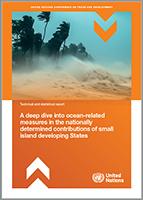
Small Island Developing States (SIDS) are widely regarded as being on the front line of the climate crisis, facing severe threats such as rising seas, stronger storms, and shrinking coastlines. While their challenges are well-documented, their leadership in developing innovative ocean-based solutions is less recognized.
This UN Trade and Development technical note highlights how SIDS are leveraging the ocean to address climate change and emphasizes the need for international cooperation and finance to secure their future.
The ocean lifeline
Since the adoption of the Paris Agreement in 2016, SIDS have played a pivotal role in climate action, submitting Nationally Determined Contributions (NDCs) to detail their pledges and commitments to greenhouse gas (GHG) reductions alongside adaptation and mitigation strategies. For these nations, the ocean is more than a resource - it is central to their economies, cultures, and livelihoods.
At the 2023 COP28 global stock-take, Parties underscored the importance of ecosystem-based approaches - including ocean-centered measures - in mitigating climate risks and delivering economic and social benefits.
However, the stock-take also made clear that current efforts are insufficient to meet the Paris Agreement’s targets, highlighting the critical need for tailored, ocean-focused solutions to address the distinct vulnerabilities faced by SIDS.
Surviving, not thriving
UNCTAD’s latest research reveals that SIDS have placed the ocean at the heart of their climate strategies. Across 39 countries, a total of 606 ocean-related measures have been identified in their NDCs, showcasing a balanced focus: 54 per cent prioritize building sustainable ocean economies, while 46 per cent target marine and coastal ecosystem conservation.
Adaptation measures dominate, reflecting the harsh reality that SIDS face. An overwhelming 77 per cent of the ocean measures aim to strengthen ecosystems, develop infrastructure, and enable economic resilience against climate impacts. Mitigation, while critical, accounts for 23%, primarily in renewable energy, shipping, and port sectors, aligning with SIDS’ minimal contribution to global CO2 emissions.
The missing trade link
The report also identifies a largely untapped opportunity in trade. Despite ocean-based goods and services exports contributing 16 per cent to SIDS’ GDP (about $160 billion in 2022), only 37% of ocean economy measures reference to the use of trade tools like tariffs, non-tariff measures trade facilitation, and blue industrial policies.
Integrating trade into NDCs could unlock powerful synergies, enhancing resilience while promoting conservation and sustainable economic growth.
However, achieving this requires addressing challenges such as limited technical capacity, financing gaps, and the integration of trade into broader climate policies.
A blueprint for the future
UNCTAD’s analysis offers timely insights to strengthen global climate and ocean strategies. As nations prepare for the 3.0 update of NDCs, the 5th United Nations Ocean Forum and the UN Ocean Conference, all in 2025, this work provides a clear pathway for aligning climate resilience, ocean conservation, and sustainable economies for SIDS and other island and coastal nations.
SIDS’ future depends on bold action and shared responsibility. Supporting their ocean-based solutions can secure a resilient, sustainable blue future for all.


